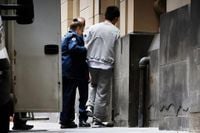Melbourne’s medical community has been rocked by the revelation that a 28-year-old trainee surgeon allegedly recorded thousands of intimate videos of colleagues in hospital restrooms, prompting urgent questions about privacy and safety in healthcare settings. Ryan Cho, a junior doctor trained at Monash University, is accused of secretly filming at least 460 women and others at three major Melbourne hospitals since 2021. The scale of the alleged violations—4,500 separate videos and nearly 500 criminal charges—has sent shockwaves through a country known for its strict privacy laws and high standards of professional conduct in medicine.
According to police documents cited by AP and other outlets, the investigation began in July 2025 after a phone was discovered actively recording from inside a mesh bag hanging in a restroom at Austin Hospital. This chance discovery led authorities to uncover a much wider pattern of alleged misconduct, with Cho suspected of placing recording devices in staff restrooms at the Peter MacCallum Cancer Center and Royal Melbourne Hospital as well. The breadth of the case, spanning multiple institutions and years, has raised the specter of systemic vulnerabilities in hospital security protocols.
Cho, who arrived in Australia as a student in 2017 and became a permanent resident in April 2025, was arrested shortly after the initial device was found. He was initially charged with six offenses, but as the investigation deepened, an additional 127 charges were added in late August, bringing the total to approximately 500. The charges include intentionally recording intimate images without permission, a serious offense under Australian law.
In a Victoria state Supreme Court hearing on August 22, 2025, Justice James Elliott ruled that Cho could be released on bail, provided he live under parental supervision. His parents, who had moved from Singapore to Melbourne in anticipation of their son’s legal troubles, posted a 50,000 Australian dollar (about $32,000 USD) surety. The conditions of Cho’s release are strict: he must remain with his parents, who are now his primary custodians, and he has surrendered his Singapore passport to prevent any risk of flight. The prosecutor, as reported by AP, argued that Cho’s suspension from his job and lack of meaningful ties to Australia could be an inducement to flee the country, especially since a conviction and a sentence of 12 months or more could see him deported. However, the judge noted that Cho had no criminal connections that would aid in his escape and that he had complied with all requirements thus far.
The allegations against Cho are particularly disturbing given their context: hospitals, where trust, vulnerability, and professionalism are paramount. As BBC and other outlets have noted, privacy violations in medical settings can have far-reaching consequences, eroding trust not just among staff but also in the broader healthcare system. The case has already sparked calls for hospitals to reassess and strengthen their surveillance and security measures to prevent similar incidents in the future. Many in the healthcare field are asking, how can institutions better protect their staff from such egregious breaches of privacy?
Police allege that Cho recorded intimate images of at least 460 women, but there is no evidence to date that any of the images were disseminated or shared. This detail, while offering some relief, does little to diminish the profound sense of violation experienced by the alleged victims and their colleagues. The psychological impact of knowing that one’s privacy may have been invaded in such a vulnerable setting is difficult to overstate.
Cho’s legal team, led by lawyer Julian McMahon, has pushed back against suggestions that their client poses a risk to the ongoing investigation. McMahon argued in court that, given the scale of the alleged offending and the number of potential witnesses—likely in the hundreds—any attempt by Cho to interfere with witnesses would be both futile and unlikely to change the outcome of the case. "There’s a sense here that if my client were to engage in the criminal offense of interfering with witnesses that it wouldn’t affect the outcome of the case," McMahon said, as reported by AP.
As of August 22, 2025, Cho has not entered any pleas. His lawyer has indicated it is too early to say whether the case will go to trial, given the complexity and volume of evidence involved. Outside the courthouse, Cho ignored reporters’ questions, leaving the building wearing sunglasses over his prescription glasses and a surgical mask—a visual that, for many, symbolized the gravity and secrecy of the allegations.
Cho’s background as a trainee surgeon and his education at Monash University add another layer of complexity to the unfolding drama. He was suspended from his job following his arrest, and the specter of deportation hangs over him should he be convicted and sentenced to a year or more in prison. For many observers, the case is a stark reminder that even in highly regulated, trusted professions, breaches of privacy can—and do—occur.
The implications of this case extend well beyond the immediate legal proceedings. As BBC and AP have both highlighted, institutions worldwide may be prompted to review their privacy protections and consider new safeguards to prevent similar incidents. Legal experts suggest that the fallout could include not just changes to hospital protocols, but also potential amendments to privacy laws, both in Australia and internationally. The case has also raised questions about the adequacy of current staff screening and monitoring practices in sensitive environments like hospitals.
For the alleged victims and their colleagues, the road ahead is likely to be long and fraught. Support services have reportedly been made available, but the sense of betrayal and violation will not be easily overcome. The broader public, meanwhile, is left to grapple with uncomfortable questions about trust, safety, and accountability in institutions that are supposed to embody care and protection.
As the legal process unfolds, all eyes will remain on Melbourne’s courts and the hospitals at the center of the scandal. The outcome will not only determine Ryan Cho’s fate, but could also set important precedents for privacy and security in workplaces everywhere. For now, the case stands as a sobering reminder of the vulnerabilities that exist even in the most trusted of settings—and the urgent need for vigilance to protect them.




